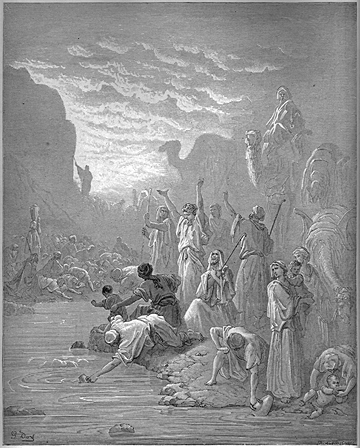Exodus 17
1 Obeying what Yahweh commanded, all the Israeli people moved from the Sin Desert. They/We traveled from one place to another. They/We camped at [a place named] Rephidim, but there was no water there for (the people/us) to drink.
Anantera maka Israeli vahe'mo'za Anumzamo'ma zmasamino, vihoma hige'za Sinie nehaza hagege ka'ma kokana atre'za, seli nona ome ki'za masete masete hu'za vu'naze. Hagi ana hu'za nevu'za henka Refitimie nehaza kumate uhanati'za seli nona ome ki'naze. Hianagi nesaza tina ana kumatera omane'ne.
2 So the people complained to Moses/me again, saying, “Give us water to drink!” Moses/I replied to them, “Why are you (criticizing/arguing with) me [RHQ]? And why are you trying to determine whether Yahweh [has the power to provide for you]?”
E'ina hige'za Israeli vahe'mo'za Mosesena ke hara hunte'za, anage hu'naze. Tina tamigeta namneno, hazageno Mosese'a anage huno zamasami'ne, nahigeta nagrira ke hara hunentaze? Nahigeta Ra Anumzamofona rehetma negaze?
3 But the people were very thirsty, and they continued to complain to Moses/me. They were saying things like “Why did you bring us out of Egypt?”, and “Did you bring us here to cause us and our children and livestock to die (from thirst/because we had no water to drink) [RHQ]?”
Hianagi vahe'mokizmia tinkura tusiza huno zmagege'za, Mosesena ke hakare hunte'za, nahigenka Isipitira tavrenka amafina e'nanketa, tagrane maka mofavrezagatine, afu'zagatinena ti ne'zankura nehuta frigahune?
4 So Moses/I prayed earnestly to Yahweh. He/I said, “(How shall I deal with these people?/I do not know how to deal with these people!) [RHQ] They are almost ready to [kill me by throwing] stones at me!”
Anama hazageno Mosese'a Ra Anumzamofontega krafa huno nunamu nehuno, Hago haveknonu nahe frigahazanki, na'a nagra ama vahera huzmantegahue huno antahige'ne?
5 Yahweh replied to Moses/me, “Take some of the elders/leaders of the Israeli people with you and [tell the rest of] the people to follow you [to Sinai Mountain]. Take along the stick with which you struck the Nile [River].
Anante Ra Anumzamo'a amanage huno asami'ne, Naeli tima amasagi'nana azompa eri'nenka, Israeli vahe'mokizmi zmavuga kva vahezaga zamavarenka ugagota hutma viho.
6 Listen carefully: I will stand in front of you on top of a [large] rock at the foot of the mountain. Strike the rock with your stick. [When you do that], water for the people to drink will flow out of the rock.” [When they/we arrived at the mountain], Moses/I did that while the Israeli elders were watching, [and water flowed from the rock].
Hagi antahio, Horepi agonafi havemofo agofetu Nagra otina manigahuanki, kagra ana azompanu havea ome amasagigeno, timo'a anampinti hanatina negahaze. Higeno Mosese'a Israeli kva vahe'mokizmi zmavuga ana zana hu'ne.
7 Moses/I gave that place two names [in the Hebrew language: ] Massah, [which means ‘testing’], and Meribah, [which means ‘complaining’]. He/I gave it the name Massah because the Israeli people were testing Yahweh, saying “Is Yahweh really among us [and able to help us], or not?”, and he/I gave it the name Meribah because they were [continually] complaining.
Ana kumakura Mosese'a Masae nehuno, Meribae hu'ne, na'ankure Israeli vahe'mo'zama haframa nehu'za, Ra Anumzamofona rehe'za nege'za, Ra Anumzamo'a tagri amu'nompina mani'nefi omani'ne?
8 Then the descendants of the Amalek people-group came and fought against the Israeli people at Rephidim.
Anantera Ameleki vahe'mo'za e'za, Israeli vahera Refitimie nehzafi hara huzmante'naze.
9 Moses/I said to Joshua, [who was one of our army/Israeli leaders], “Choose some men to go out and fight against the Amalek people-group tomorrow. I will stand on the top of the hill, holding the stick that God told me to carry.”
Ana hazageno Mosese'a anage huno Josuana asmi'ne, Mago'a vahera tagripintira huhamprizmantege'za Ameleki vahe'enena hara ome hiho. Okina nagra Anumzamofo azompa nzampi eri'ne'na agonarera otigahue.
10 So Joshua did what Moses/I told him to do. He took some men to fight against the Amalek people-group. [While they were fighting], Aaron, Hur, and Moses/I went up to the top of the hill [so that they/we could see the whole battle area].
Mosese'ma asamia kante anteno, Josua'a Amaleki vahe'enena hara nehige'za, Mosese'ma, Aroni'ma, Huri'ma hu'za agonarega mreri'naze.
11 Whenever Moses/I lifted up his/my arms, the Israeli men started to win [the battle]. And whenever he/I lowered his/my arms, the Amalek people-group started to win.
Hagi Mosese'ma azama erintesga hige'za, Israeli vahe'mo'za hara Amaleki vahera huzmangatere'naze. Hagi Mosese'ma aza'ma erinte fenka atrege'za, Ameleki vahe'mo'za Israeli vahera hara huzmagetere'naze.
12 But his/my arms became tired. So Aaron and Hur [rolled] a [large] stone for Moses/me to sit on. [While he/I was sitting on it], those two held up his/my arms, [one on one side and the other on the other side]. In that way, they kept his/my arms lifted up, and his/my arms held steady until the sun went down.
Hianagi Mosese azamo'a arageramigeno, Aroni'ene Hurikea have erike, mopafi ante'nakeno anante mani'nege'ne, rugaraga mani'neke azana erisga hu'nakeno kinagaseno zagea urami'ne,
13 So Joshua and the men with him completely defeated the Amalek people-group, using their swords [to fight against them].
Josua'ene Israeli vahe'mo'za bainati kazinu Ameleki vahera zmahege'za kazimofo ne'za se'naze.
14 Then Yahweh said to Moses/me, “Write an account of this battle, and then read it to Joshua. [Also write that some day] I will completely get rid of the Amalek people-group.”
Anantera Ra Anumzamo'a anage huno Mosesena asami'ne, Ama ha'mofo agenke'a avontafepi kretenegeno avame'za me'nenke'za nege'za zmagera okaniho. Hagi Josuana hamprinka ama ana nanekea asamio, Nagra ama mopafintira Ameleki vahera zamahe fanane hanugeno zmagi zmagenkea ama mopafina omanegahie.
15 Then Moses/I built a [stone] altar there and named it ‘Yahweh is [like] my flag’.
Mosese'a anante Kresramanavu ita tro huno, Ra Anumzamo'a nagri krauvefani'e (frekie) huno agia antemi'ne.
16 He/I said, “Hold high Yahweh’s flag! Yahweh will continue to fight against the Amalek people-group (forever/in all future generations)!”
Mosese'a anage hu'ne, Ra Anumzamofo hanave eritre'za hazankino, Amaleki vahera henkama fore hunante anante hu'za esaza vahera, Ra Anumzamo'a huvempa hu'neankino ha' huzmantegahue hu'ne.





















